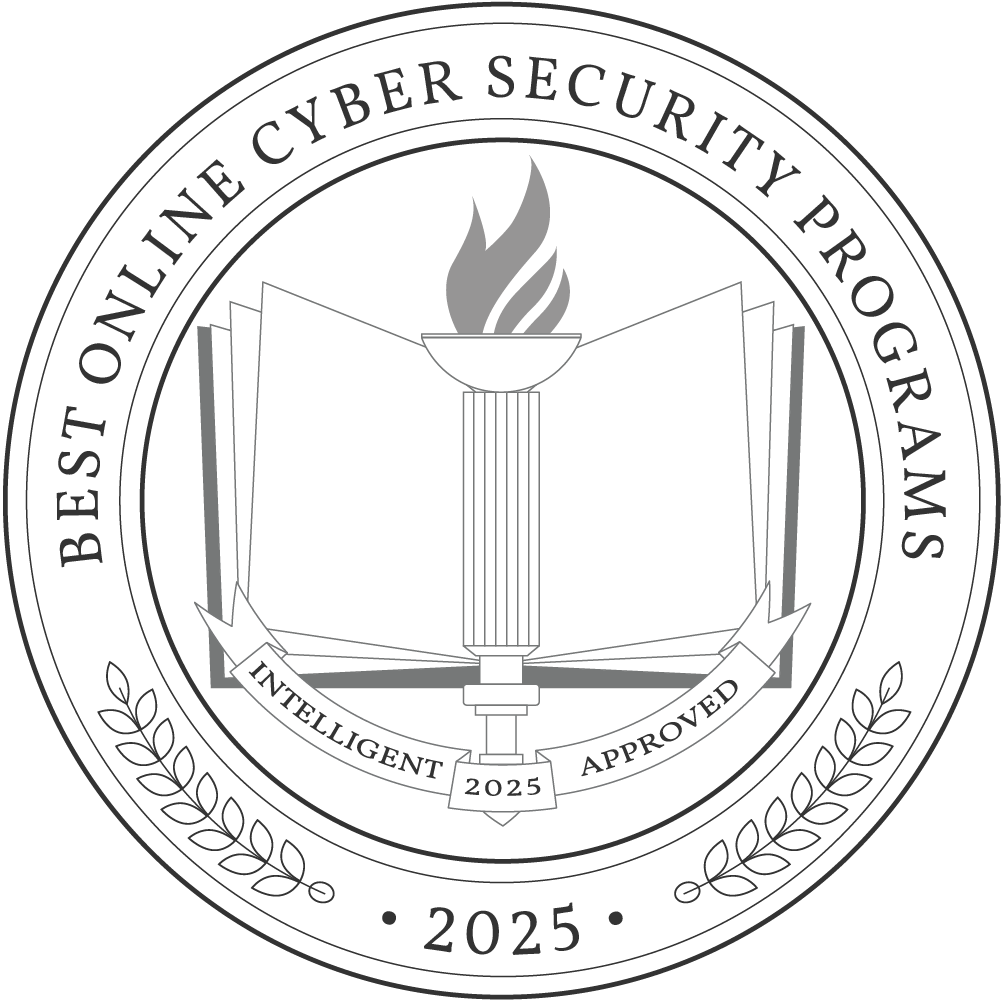For tech-savvy problem solvers passionate about safeguarding the digital world, an online cybersecurity degree is the key to a lucrative, rewarding career. In the dynamic digital security landscape, cybersecurity analysts are in high demand, with a projected increase of 32% in job growth. In addition, salaries consistently reach six figures, with a median salary of $112,000 in 2022. Graduates interested in leadership roles, such as cybersecurity manager, see even higher wages of $164,070, with 46,900 job openings expected yearly over the next decade.
Yet, knowing which program is right for you can be challenging with so many programs available. That’s why Intelligent.com has combed through dozens of programs to create this list of the best online cybersecurity programs today.
This article reviews how to align your expectations depending on your degree level, standard curriculum components, and learning formats. Later on, we’ll take a close look at the most popular career options for graduates to pursue and provide tips on how to select the best program for you, how to conduct your research, and what you should prioritize when it comes time to apply.
Why Trust Us
The Intelligent.com Higher Education Team is dedicated to providing students with independent, equitable school and program rankings and well-researched resources. Our expert-driven articles cover topics related to online colleges and programs, paying for school, and career outlooks. We use data from the U.S. Department of Education’s College Scorecard, the National Center for Education Statistics, and other reputable educational and professional organizations. Our academic advisory team reviews content and verifies accuracy throughout the year for the most current information. Partnerships do not influence rankings or editorial decisions.
- Analyzed over 2,000 national, accredited, and nonprofit colleges and universities
- 800+ rankings pages are reviewed and updated yearly
- Content is informed by reputable sources, surveys, and interviews with academic advisors and other experts
- Over 100 data points are reviewed for accuracy and quality throughout the year, including sources
How we rank schools
Our list features the best online Cyber Security degree programs at top colleges nationwide. Each school featured is a nonprofit, accredited institution — either public or private — with a high standard of academic quality for post-secondary institutions.
We evaluated each school’s program on tuition costs, admission, retention and graduation rates, faculty, reputation, and the student resources provided for online students. We collected data from trusted sources like the National Center for Education Statistics, individual school and program websites, school admissions counselors, and other data sources. Then, we calculated the Intelligent Score on a scale of 0 to 100 based on the following criterion:
Academic Quality:
- Admission rate versus enrollment rate
- Retention rate of students who return after year one
- Accreditation status (regional and programmatic)
- Nonprofit status, both private and public institutions
Graduation Rate
- Overall graduation rate
- Total number of currently enrolled students, including diversity metrics
- Student-to-faculty ratio
Cost and ROI
- In-state and out-of-state per-credit tuition rates and fees
- Required credits to graduate
- Earning potential after graduation
- Availability of federal student loans, scholarships, and other financial aid options
Student Resources
- Available student services for online-only and hybrid programs
- On-campus amenities like tutoring centers and the number of libraries
Read more about our ranking methodology.
Best 47 Online Cyber Security Degree Programs
FiltersInstitution Type
Status
- Intelligent Score
- Alphabetically By University Name
- Acceptance Rate
- Enrollment
- In-state Graduate Tuition
- Out-of-state Graduate Tuition
- In-state Undergraduate Tuition
- Out-of-state Undergraduate Tuition

Davenport University
Intelligent Score: 99.64In-state: $19,320
Out-of-state: $19,320
In-state: $15,696
Out-of-state: $15,696
SAT: N/A
ACT: N/A
Resident: $974
Non-Resident: $658
Online, On-Campus
Higher Learning Commission
120

Norwich University
Intelligent Score: 99.33In-state: $40,608
Out-of-state: $40,608
In-state: $18,614
Out-of-state: $18,614
SAT: N/A
ACT: N/A
$375
Online
New England Commission of Higher Education
120

Champlain College
Intelligent Score: 98.74In-state: $64,010
Out-of-state: $68,575
In-state: $19,635
Out-of-state: $19,635
SAT: 1224
ACT: 28
$335
Online
New England Commission of Higher Education
120

City University of Seattle
Intelligent Score: 97.31In-state: $13,658
Out-of-state: $13,658
In-state: $11,812
Out-of-state: $11,812
SAT: N/A
ACT: N/A
$525
Online
Northwest Commission on Colleges and Universities
120

Utica University
Intelligent Score: 95.24In-state: $39,718
Out-of-state: $39,718
In-state: $47,915
Out-of-state: $47,915
SAT: 1084-1250
ACT: 23-32
$475
Online, On-Campus
Middle States Commission on Higher Education
120

PennState World Campus
Intelligent Score: 93.75In-state: $15,025
Out-of-state: $24,413
In-state: $22,464
Out-of-state: $22,464
SAT: 1070-1300
ACT: 24-29
$678
Online, On-Campus
Middle States Commission on Higher Education
123

Dakota State University
Intelligent Score: 92.72In-state: $7,541
Out-of-state: $10,611
In-state: $5,939
Out-of-state: $5,939
SAT: 1010-1190
ACT: 19-26
Resident: $354
Non-Resident: $464
Online, On-Campus
Higher Learning Commission
120

Kennesaw State University
Intelligent Score: 92.53In-state: $4,450
Out-of-state: $15,704
In-state: $5,328
Out-of-state: $5,328
SAT: 1030-1200
ACT: 19-25
$185
Online
Southern Association of Colleges and Schools Commission on Colleges
120

Maryville University
Intelligent Score: 92.09In-state: $24,766
Out-of-state: $24,766
In-state: $14,346
Out-of-state: $14,346
SAT: N/A
ACT: N/A
$637
Online, On-Campus
Higher Learning Commission
128

Drexel University
Intelligent Score: 91.75In-state: $53,868
Out-of-state: $53,868
In-state: $36,234
Out-of-state: $36,234
SAT: 1180-1380
ACT: 25-31
$591
Online, On-Campus
Middle States Commission on Higher Education
123

Bellevue University
Intelligent Score: 91.12In-state: $7,176
Out-of-state: $7,176
In-state: $10,710
Out-of-state: $10,710
SAT: N/A
ACT: N/A
$449
Online, On-Campus
Higher Learning Commission
127

University of Arizona
Intelligent Score: 90.74In-state: $10,990
Out-of-state: $33,273
In-state: $11,938
Out-of-state: $11,938
SAT: 1090-1350
ACT: 21-29
$500
Online, On-Campus
Western Association of Schools and Colleges Senior College and University Commission
120

Regent University
Intelligent Score: 90.71In-state: $17,220
Out-of-state: $17,220
In-state: $15,552
Out-of-state: $15,552
SAT: 940-1220
ACT: 21-29
$395
Online, On-Campus
Southern Association of Colleges and Schools Commission on Colleges
120

Wilmington University
Intelligent Score: 90.43In-state: $11,430
Out-of-state: $11,430
In-state: $8,784
Out-of-state: $8,784
SAT: N/A
ACT: N/A
$419
Online, On-Campus
Middle States Commission on Higher Education
120

Charter Oak State College
Intelligent Score: 89.91In-state: $22,558
Out-of-state: $25,100
In-state: $17,457
Out-of-state: $17,457
SAT: Not Required
ACT: Not Required
$329
Online
New England Commission of Higher Education
120

Southern Illinois University
Intelligent Score: 89.70In-state: $9,591
Out-of-state: $9,591
In-state: $11,268
Out-of-state: $11,268
SAT: 930-1180
ACT: 20-27
$321
Online, On-Campus
Higher Learning Commission
120

Oklahoma State University Institute of Technology
Intelligent Score: 88.72In-state: $13,404
Out-of-state: $19,014
In-state: NA
Out-of-state: NA
SAT: NA
ACT: NA
$192
Online
Computing Accreditation Commission of ABET
121

Robert Morris University
Intelligent Score: 88.55In-state: NA
Out-of-state: NA
In-state: NA
Out-of-state: NA
SAT: 1040-1230
ACT: 24-28
$875
Online, On-Campus
Computing Accreditation Commission of ABET
120
What Can I Expect from an Online Cybersecurity Program?
An online cybersecurity program offers a flexible pathway to a career in the ever-evolving realm of digital security. These programs typically encompass a range of degree levels, including associate, bachelor’s, and master’s degrees, allowing you to choose the level that best suits your professional goals and background.
| Degree level | Degree title | Number of credits |
| Associate | Associate of Science (AS)
Associate of Applied Science (AAS) |
60 |
| Bachelor’s | Bachelor of Science (BS)
Bachelor of Applied Science (BAS) Bachelor of Business Administration (BBA) |
120 |
| Master’s | Master of Science (MS)
Master of Business Administration (MBA) Master of Engineering |
30-60 |
At the undergraduate level, an associate degree often serves as an introductory step, focusing on fundamental concepts in cybersecurity. Bachelor’s programs delve deeper into the field, covering network security, ethical hacking, and digital forensics. Students can expect a curriculum comprising core courses, electives, and possibly specialization options, such as cybersecurity management or information assurance.
Master’s programs offer a higher level of expertise and specialization. These may involve concentrations like cyber risk management or digital security analysis. Master’s students often complete a capstone project or thesis, showcasing their ability to tackle real-world cybersecurity challenges.
Regardless of the degree level, cybersecurity programs often include hands-on labs, simulated cyberattacks, and exposure to cutting-edge tools and techniques. Many programs also emphasize internships or cooperative work experiences to gain practical skills and establish industry connections.
Asynchronous vs. synchronous?
Online cybersecurity programs provide flexibility in terms of course delivery. Synchronous courses require real-time participation, while asynchronous options allow you to learn at your own pace. Hybrid programs blend online and in-person components, accommodating a wider range of schedules.
How to Choose the Online Cybersecurity Degree Program That’s Right for You
Step 1: Choose your area of study
Choosing the right cybersecurity area of study hinges on clarifying your career goals. Start by asking yourself:
- What aspect of cybersecurity fascinates me?
- What career path aligns with my interests?
- What’s my desired level of education?
- Am I interested in a specialization?
Understanding your career objectives and personal interests will guide your choice of degree and specialization.
In addition, be sure to consider which learning format suits you best. Online programs frequently offer asynchronous and synchronous coursework; some may offer a mix of both. Synchronous courses offer real-time interactions with instructors and peers but require set class times, which may not suit those with busy schedules. Asynchronous courses provide flexibility but demand self-discipline and time management skills. Choosing the format that aligns best with your lifestyle and ensures the successful completion of your cybersecurity degree is crucial.
Step 2: Research schools and programs
With your intended specialization and desired learning format, you can begin researching schools and programs that will elevate your educational experience.
First, check for each program’s accreditation. Nationally recognized accrediting bodies have thoroughly vetted accredited programs and can help ensure a program’s overall quality.
Then, consider asking:
- What is the program’s reputation and ranking?
- Are their faculty members with real-world cybersecurity experience?
- Does the curriculum align with my career goals and interests?
- Are there opportunities for hands-on learning or internships?
- What is the program’s track record for job placement and alumni success?
You can usually find most of this information on the school’s official website — but it’s worth exploring platforms like LinkedIn and Reddit for alums and student reviews or reaching out to the career services departments of potential schools to inquire about job placement rates and employer partnerships.
Step 3: Prepare for applications and tests
Once you have a short list of cybersecurity schools that align with your academic expectations and career goals, it’s time to prepare for applications and standardized tests. Application requirements vary by school and degree level, but generally include:
- Completed application forms
- Transcripts from previous education
- Letters of recommendation
- Personal statement or essay
- Test scores — the SAT or ACT for undergraduates and the GRE for graduates
To boost test scores, consider test prep programs for the ACT or SAT if you’re an undergraduate and the GRE for graduate studies. These programs offer valuable test-taking strategies and practice tests to improve performance and can significantly affect your test scores.
Step 4: Select your program
Some students apply to several schools to explore their options and increase their chances of acceptance. Conversely, others opt for one or two carefully chosen schools to focus efforts and tailor applications to specific programs. Either option has its merits, so both approaches are worth considering.
To select the right program for you, consider factors like the availability of your chosen specialization, the faculty who teach there, career services, and geographic location. Ensure that your chosen school aligns with your academic and career goals, setting you up for success in future years.
Step 5: Determine how you’ll pay for your degree
Paying for a cybersecurity degree can be manageable with the right financial strategies. Prioritize scholarships and grants, as they don’t require repayment and can significantly reduce tuition expenses. It’s also essential to complete the Free Application for Federal Student Aid (FAFSA), as it determines your eligibility for federal funding — including lower-interest federal student loans with flexible repayment options.
Other options for financial assistance include GI Bill Benefits, employer tuition assistance benefits, and payment plans.
Still Looking for the Right Fit? Discover Similar Programs
- Online Associate in Computer Programming
- Online Computer Programming Degrees
- Online Information Technology Degrees
- Online Master’s in Artificial Intelligence
- Online Master’s in Data Science
- Online Master’s in Information Systems and Technology
What Can I Do With an Online Cyber Security Degree?
Career outlook
Graduates with a cybersecurity degree have a wide range of career paths to choose from, given the growing importance of cybersecurity in today’s digitally-dependent world. Some of the most common career paths include:
- Cybersecurity Analyst — These professionals monitor organizations’ networks and systems for security breaches and vulnerabilities. They respond to incidents, conduct security assessments, and implement security measures. Many cybersecurity analysts enter the field with a bachelor’s degree.
- Median annual salary: $112,000
- Projected employment growth (through 2032): 32%
- New jobs projected: 16,800
- Cybersecurity Manager — These roles involve overseeing an organization’s cybersecurity program. They manage teams of security professionals, set security policies, and make strategic decisions to protect the organization. While pursuing this career with a bachelor’s degree and adequate work experience is possible, many cybersecurity managers have a master’s degree.
- Median annual salary: $164,070
- Projected employment growth (through 2032): 15%
- New jobs projected: 46,900
- Security Software Developer — Developers in this field create security solutions, including antivirus software, firewalls, and encryption tools. They ensure that the software is secure by design. Similar to other careers in software development, graduates can secure these roles with a bachelor’s degree, but some employers might prefer candidates with a graduate degree.
- Median annual salary: $127,260
- Projected employment growth (through 2032): 25%
- New jobs projected: 153,900
Online College/Degree Scholarship Database
Intelligent Scholarship Finder Tool
"A Helping Hand" Scholarship
Award Amount: $500
Due Date: January 31, 2025
"Follow Your Own Path" Essay Scholarship
Award Amount: $500
Due Date: January 31, 2025
"Tuition Solution" Scholarship for STEM Students
Award Amount: $500
Due Date: January 31, 2025
$25k "Be Bold" No-Essay Scholarship
Award Amount: $25,000
Due Date: Closed for 2024
(ISC) Graduate Cybersecurity Scholarship
Award Amount: $5,000
Due Date: Closed for 2024
(ISC) Women in Information Security Scholarship
Award Amount: $5,000
Due Date: Closed for 2024
A.C. "Kate" & Leo Joseph Merlone St. Dominic Catholic Church of Saginaw Member Scholarship
Award Amount: Varies
Due Date: Closed for 2024
A.C. "Kate" & Leo Joseph Merlone Teaching Scholarship
Award Amount: Varies
Due Date: Closed for 2024
a/e ProNet David W. Lakamp Scholarship
Award Amount: $5,000
Due Date: Closed for 2024
AAAE Native American Scholarship
Award Amount: $1,500
Due Date: March 15, 2025
Frequently Asked Questions About Online Cyber Security Degree Programs
Should I get a cyber security degree in person or online?
Since many in-person universities use an identical curriculum for online programs, the overall program quality will be the same whether you attend in-person or online. Moreover, this decision depends on your scheduling needs and learning preferences.
Attending in person might be your best fit if you value face-to-face interaction with your professors and peers or prefer a structured schedule. However, these programs often provide limited flexibility for working professionals and may incur higher costs due to commuting and housing.
Online programs are usually best for working adults or those with other commitments, as they lend access to high-quality learning from anywhere in the world. It may also lead to potential savings on commuting and housing. Yet, it’s important to note that online programs have less in-person interaction and require self-discipline and time management skills.
Ultimately, you’ll want to choose the program that best aligns with your lifestyle, goals, and learning style, as both options can be the right decision for different reasons.
How do I apply to an online cybersecurity degree program?
Review the specific eligibility programs for the program you’re interested in. For bachelor’s degrees, this typically includes a high school diploma or equivalent. Master’s programs often require a relevant bachelor’s degree.
Next, you’ll want to gather necessary documents, such as transcripts, letters of recommendation, and a personal statement. Most programs offer their application on their website, so be sure to visit it, fill out the application, and upload your documents according to the school’s instructions.
Be conscious of application deadlines, and don’t hesitate to double-check them or contact admissions counselors to ensure you’re on track. Some programs have rolling admissions, while others have specific dates.
What is the average cost of an online cybersecurity degree?
For the 2021-22 academic year, undergraduate programs saw an average tuition of $9,596 at public universities and $37,222 at private colleges. Graduate students paid an average of $12,394 at public institutions and $26,621 at private schools.
As illustrated above, the average cost of an online cybersecurity degree can vary significantly based on several factors. For example, tuition at public institutions is generally more affordable than private schools because they receive some funding from the government. Some public schools also offer in-state tuition to online students, which can further reduce the cost.
How long does it take to complete an online cybersecurity degree program?
The duration to complete an online cybersecurity degree program varies based on the following factors:
- Degree Level: A bachelor’s program typically takes three to four years, while a master’s program may take 18 months to two years.
- Delivery Format: Full-time online programs often follow a traditional semester schedule, while part-time options allow for flexibility and may extend the timeline.
- Enrollment Status: Full-time students can complete their degrees more quickly, while part-time students progress slower.
- Accelerated Programs: Some institutions offer accelerated options that condense coursework, allowing students to graduate sooner, often within 18 months or less for master’s degrees.
Ultimately, the time required to earn an online cybersecurity degree depends on your degree level, enrollment status, and program format.
Is an online cybersecurity degree worth it?
An online cybersecurity degree is often worth it, considering the strong return on investment (ROI). Careers like cybersecurity analysts frequently yield six-figure salaries with just a bachelor’s degree. Pursuing leadership roles with a master’s degree can lead to even higher earning potential over time. Given the increasing demand for cybersecurity professionals and their critical role in safeguarding digital assets, the investment in education and training typically pays off well in this field.
Compare School Options
Related Degrees
- Database Management
- Web Development
- Cybersecurity
- Computer Science
- Information Technology
- Computer Forensics
- Internet Security
- Network Administration
- Cyber Security
- Web Design


